HOME | ABOUT US | MEDIA KIT | CONTACT US | INQUIRE
HOME | ABOUT US | MEDIA KIT | CONTACT US | INQUIRE
Once again, great employers show that you create culture and loyalty with a comprehensive approach to workplace, compensation and benefit design.
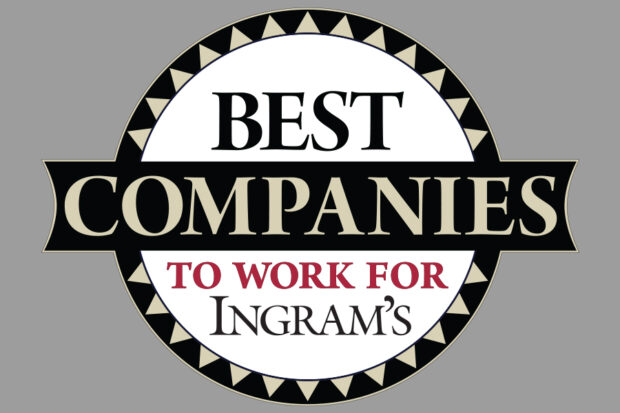
Also in this very issue, you’ll see the Ingram’s 100, our annual update of the region’s biggest private companies, the crown jewels of commerce in Kansas City and beyond. A careful reading of that list will show that health care, construction/engineering, financial services, and the transportation-logistics domains have some big players hereabouts.
But this ain’t that. Here, our Best Companies to Work For recognition includes just 18 organizations—large, small, and in between. A funny thing happens, though, if you layer the smaller set here over the larger 100: Some of those big corporate players are also some of the best employers in the land.
There’s a reason for that: By creating high-functioning organizations—in some instances, a process that has taken decades to perfect—and by crafting high-performing workforces, those commercial giants have demonstrated the power of corporate culture and leading-edge workplace design.
That goes beyond mere physical workspaces to encompass the entire employee experience, which is what drives job longevity, employee engagement levels, and individual performance. A cool workspace is nice, but a cool workspace with a killer suite of benefits and a compensation package that gives you more than a paycheck-to-paycheck lifestyle—well, that’s what creates career destinations.
The bigger the employer, of course, the more likely the organization can financially support and cost-justify those sector-leading and market-leading levels of pay, benefits, and workplace amenities. But this year’s honorees in the mid-size and small categories clearly demonstrate that you don’t have to dominate in your sector to stand out as an employer and that innovative workplace design is always within reach.
If you’ve been following this series since its inception in 2008, you’ll be familiar with corporate names recognized this year, such as JE Dunn Construction, Blue Cross and Blue Shield of Kansas City, Creative Planning, and Midway Ford Truck Center. But if you’re wondering why you didn’t see any of those names recognized in the past two years, it’s because of the eligibility structure for this recognition. Winners in any one year must sit out the next two. Otherwise, it could be the same companies, year after year.
This way, excellence in workplace design can be rewarded across a much larger group of employers who have jumped out of their shoes to take care of their folks. So note well this year’s winners; you won’t see them back here again before 2025 at the earliest. But that doesn’t mean some terrific employers are being overlooked.
Join us, then, in saluting this year’s honorees as they take their turns in the spotlight among the Best Companies to Work For in the Kansas City region.
CONGRATULATIONS TO OUR 2022 WINNERS:
LARGE COMPANIES
Blue KC, Children’s Mercy, Creative Planning, Custom Truck One Source, JE Dunn Construction, LMH Health
MID-SIZE COMPANIES
Alphapointe, Basys Processing, CrossFirst Bank, GBA Companies, Midway Ford Truck Center, ReeceNichols Real Estate
SMALL COMPANIES
AdamsGabbert, Crux KC, Dynamic Logistix, Sethmar Transportation, SpecChem, Spotlight Analyst Relations
Blue KC
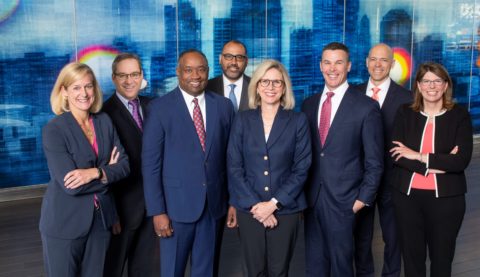 You can’t live life outside of work for your employees, but you can surely provide them with the tools they need to succeed there, as well as on the job. At a company tasked with providing health-care insurance for 1 million souls in this region, that’s how Blue KC rolls. “Meeting each employee where they are, we’ve created an environment focused on wellness and support for the whole person, with special attention on behavioral, physical and emotional health, and financial well-being,” says CEO Erin Stucky. “Our flexible work schedules and work-from-home opportunities help employees strike a balance between their career and their personal lives,” she said. Things start with a highly competitive total rewards package, with employees eligible for incentive plans that align their performance and achievement of company goals. From Day One, employees are eligible for health, dental and vision insurance. There is also coverage for life and accidental death and dismemberment, and both health savings and flexible spending accounts. Other risk-management tools include voluntary group accident, critical illness, hospital indemnity, and prepaid legal coverage. To all of that, add coverage for short- and long-term disability. Four weeks of paid paternal leave, 18 days of paid time off right out of the gate for new employees, and tuition reimbursement also provide support for that whole-person care package. To support employees’ philanthropy, there’s a paid day off each year to volunteer for a deserving cause. The 401(k) retirement plan includes both a pre-tax deferral option and a Roth deferral option. Blue KC matches 50 percent of the first 10 percent contributed to the 401(k) by the employee, and also makes discretionary contributions based on company performance. There’s free on-site parking, always a consideration for a Downtown business, and to help with the physical well-being, employees have use of the free 24/7 on-site fitness center. Access to personal trainers is provided, and employees can opt for walking workstations. There’s even on-site massage available, along with staples like on-site flu shots, mobile mammograms, and health screenings. Are you a biker? Check out the 80 minutes of free access daily to RideKC bikes and e-bikes around KC. Especially since the onset of the 2020 pandemic, employers have factored mental health into their plans, and Blue KC has led the way with free access to its behavioral-health service, Mindful by Blue KC. It offers tools and services to address stress, depression, anxiety, and substance use, among other conditions. Mental-health pros are available for monthly sessions on timely topics, and Blue’s own Quarterly Mental Health First Aid program helps remove the stigma around behavioral health issues in the workplace.
You can’t live life outside of work for your employees, but you can surely provide them with the tools they need to succeed there, as well as on the job. At a company tasked with providing health-care insurance for 1 million souls in this region, that’s how Blue KC rolls. “Meeting each employee where they are, we’ve created an environment focused on wellness and support for the whole person, with special attention on behavioral, physical and emotional health, and financial well-being,” says CEO Erin Stucky. “Our flexible work schedules and work-from-home opportunities help employees strike a balance between their career and their personal lives,” she said. Things start with a highly competitive total rewards package, with employees eligible for incentive plans that align their performance and achievement of company goals. From Day One, employees are eligible for health, dental and vision insurance. There is also coverage for life and accidental death and dismemberment, and both health savings and flexible spending accounts. Other risk-management tools include voluntary group accident, critical illness, hospital indemnity, and prepaid legal coverage. To all of that, add coverage for short- and long-term disability. Four weeks of paid paternal leave, 18 days of paid time off right out of the gate for new employees, and tuition reimbursement also provide support for that whole-person care package. To support employees’ philanthropy, there’s a paid day off each year to volunteer for a deserving cause. The 401(k) retirement plan includes both a pre-tax deferral option and a Roth deferral option. Blue KC matches 50 percent of the first 10 percent contributed to the 401(k) by the employee, and also makes discretionary contributions based on company performance. There’s free on-site parking, always a consideration for a Downtown business, and to help with the physical well-being, employees have use of the free 24/7 on-site fitness center. Access to personal trainers is provided, and employees can opt for walking workstations. There’s even on-site massage available, along with staples like on-site flu shots, mobile mammograms, and health screenings. Are you a biker? Check out the 80 minutes of free access daily to RideKC bikes and e-bikes around KC. Especially since the onset of the 2020 pandemic, employers have factored mental health into their plans, and Blue KC has led the way with free access to its behavioral-health service, Mindful by Blue KC. It offers tools and services to address stress, depression, anxiety, and substance use, among other conditions. Mental-health pros are available for monthly sessions on timely topics, and Blue’s own Quarterly Mental Health First Aid program helps remove the stigma around behavioral health issues in the workplace.
Children’s Mercy Kansas City
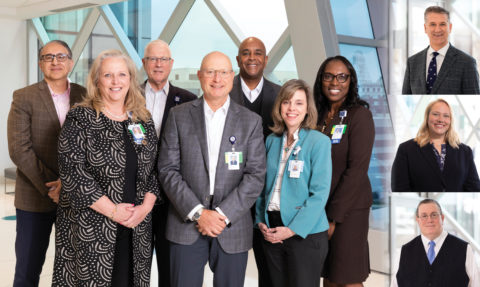 At Children’s Mercy Kansas City, the stated vision is “to create a world of well-being for all children.” That doesn’t happen without creating a workplace of well-being for those tending their young charges. Over a span of 125 years, and with more than 8,000 employees across 20 care sites in Missouri and Kansas, Children’s Mercy has become a career destination within the health-care sector by building on “the determination, grit, and compassion of our founding sisters,” says CEO Paul Kempinski. The workplace culture, as you might expect from a Lean organization, is built upon five True North pillars: quality and safety, people, patient and family experience, delivery, and stewardship. And within the people pillar, the health system focuses on a culture that engages employees to be and perform their best. Some examples: The in-house Berry Institute provides improvement and leadership experiences. The Center for Wellbeing promotes well-being through awareness and mindful balance. The Tuition Assistance Program doles out more than $2.2 million a year, providing up to $5,250 per calendar year for an employee’s education expenses. Not surprisingly with a health-care provider, medical coverage picks up 100 percent of the cost of preventative care, and there are medical discounts for employees’ children, whether they are carried on the plan or not. Even retired employees and spouses are covered. Wellness and fitness centers are on-site, and staff members can access more than 30,000 local and national services and products at discounted prices. A robust Employee Assistance Program provides 24/7 confidential counseling, financial guidance, legal support, and work-life solutions. Those saving for retirement can tap into the hospital-funded plan and a tax-deferred annuity plan with a 3 percent company match after 90 days of employment. Equity and diversity initiatives incorporate leadership, patient-provider communication, care of delivery, workforce training, and community engagement and research. And when it comes to community partnerships, there are ventures like the Kids Eat Free meal program and Project R.I.S.E.—Reaching for Independent Successful Employment, to assist those with disabilities. “The 125 years of history we’re celebrating this year,” Kempinski says, “has provided the foundation for where we’re going.”
At Children’s Mercy Kansas City, the stated vision is “to create a world of well-being for all children.” That doesn’t happen without creating a workplace of well-being for those tending their young charges. Over a span of 125 years, and with more than 8,000 employees across 20 care sites in Missouri and Kansas, Children’s Mercy has become a career destination within the health-care sector by building on “the determination, grit, and compassion of our founding sisters,” says CEO Paul Kempinski. The workplace culture, as you might expect from a Lean organization, is built upon five True North pillars: quality and safety, people, patient and family experience, delivery, and stewardship. And within the people pillar, the health system focuses on a culture that engages employees to be and perform their best. Some examples: The in-house Berry Institute provides improvement and leadership experiences. The Center for Wellbeing promotes well-being through awareness and mindful balance. The Tuition Assistance Program doles out more than $2.2 million a year, providing up to $5,250 per calendar year for an employee’s education expenses. Not surprisingly with a health-care provider, medical coverage picks up 100 percent of the cost of preventative care, and there are medical discounts for employees’ children, whether they are carried on the plan or not. Even retired employees and spouses are covered. Wellness and fitness centers are on-site, and staff members can access more than 30,000 local and national services and products at discounted prices. A robust Employee Assistance Program provides 24/7 confidential counseling, financial guidance, legal support, and work-life solutions. Those saving for retirement can tap into the hospital-funded plan and a tax-deferred annuity plan with a 3 percent company match after 90 days of employment. Equity and diversity initiatives incorporate leadership, patient-provider communication, care of delivery, workforce training, and community engagement and research. And when it comes to community partnerships, there are ventures like the Kids Eat Free meal program and Project R.I.S.E.—Reaching for Independent Successful Employment, to assist those with disabilities. “The 125 years of history we’re celebrating this year,” Kempinski says, “has provided the foundation for where we’re going.”
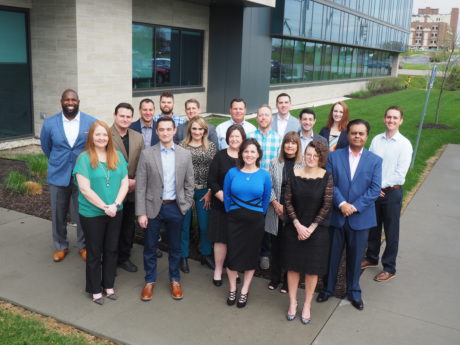
If you haven’t been following the story of Creative Planning over the past 15 years, you’ve missed an opportunity to watch a large company’s culture being constructed from the ground up. CEO Peter Mallouk, who bought a boutique wealth-management firm in 2006, has turned it into a national powerhouse with nearly $135 billion in assets directly under management and more than $110 million through its acquisition of Lockton Retirement Services last year. Mallouk meets personally with every finalist for a job opening there, and that’s a lot of meetings: Creative Planning now boasts more than 1,200 employees nationwide. He defines that culture in three words: Passion, determination, and commitment. “An employee’s exposure to our culture begins even before they receive an employment offer from us,” says his executive assistant, Christy Watson. The meetings with finalists, she says, are “to make sure the person is a good cultural fit. It’s that important to him that we only hire the best … the employees who will continue to embody and grow our culture.” That means embracing a team-based approach to comprehensive wealth management, and it pays off when members of the team earn company-paid trips for organizational success. The campus that opened in Overland Park in 2018 includes social spaces and amenities to encourage gathering, including an on-site café and patios, where you can find beanbag tournaments or employee baby showers in progress. On the financial side, a highly competitive compensation structure took on new overtones last year when Mallouk began opening up ownership shares with equity opportunities for a portion of the staff. There’s also the company’s 401(k) retirement plan with its company match on a portion of each employee’s contributions. Staff well-being is addressed with a comprehensive suite of insurance tools, including health, dental, vision, life, and disability coverage. And there’s no shortage of staff outings, from Royals games to the American Royal barbecue, to build cohesiveness. The icing on all that is the ability to work for a firm that shares the wealth, an important consideration for younger members of the workforce who want their work to have meaning beyond the paycheck. To date, the firm has donated more than $25 million to those in need and provides countless service hours for causes like Giving the Basics, Catholic Charities of Northeast Kansas, blood drives, non-perishable food collections and, in 2021, it opened Pathway Financial Education, promoting financial literacy and training for small businesses and individuals.
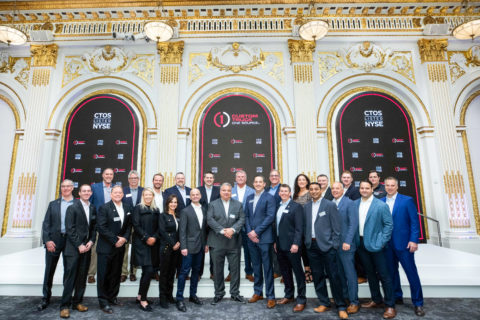
At every step from inception to its recent listing on the New York Stock Exchange, Custom Truck One Source has been defined by one enduring trait: Family. It had to be: 10 of the 12 Ross family siblings founded the company in a three-bay shop on Manchester Avenue 25 years ago. Since then, this manufacturer and supplier of vehicles used for infrastructure construction and repair has grown into a work force of nearly 2,000 employees in 37 locations across the U.S. and Canada. You can quite literally say the Ross family DNA is in Custom Truck. “Family and Custom Truck One Source have been inseparable since the beginning,” says CEO Fred Ross. “One of the reasons for our success is making sure that our culture remains intact as we rapidly grow.” Never has that undertaking been as important as over the past year, following a $1.475-billion merger with Nesco Holdings. Since then, and with the 25 percent bump in the employee head count, Ross and the team have put in programs to help the growing corporate family achieve individual and organizational goals. One way to do that is by bringing together employees with similar interests and life experiences. An example of that in practice: Last year, Custom Truck launched its Veterans Employee Resource Group, by which employees shape a diverse, inclusive workplace that aligns with the organizational mission, values, goals, business practices, and objectives. It stems from Fred Ross’ deep commitment to supporting veterans and their families and also recruits veterans to become future employees. To help develop talent, Custom Truck University offers tuition reimbursement toward any type of degree, certification, or training that prepares or advances an employee’s skills for any job at the company. In-house, CTU has thousands of on-demand courses and learning tracks for both professional and personal development. Welding instruction is provided in-house to those interested, and CTU also offers that training to community high school, technical college, and vocational students. Employees find competitive health-care coverage with plans that include dental, vision, and life insurance, as well as short- and long-term disability coverage, with discounts for life partners. The surrounding community is important to Custom Truck and the Ross family because both grew up in the area around the company’s main office. Custom Truck actively supports several local non-profit endeavors and partners with the Bishop Sullivan Center, and over the holidays, Custom Truck made a special delivery of LEGO toy bucket trucks to Children’s Mercy Hospital for young patients.
JE Dunn Construction Co.
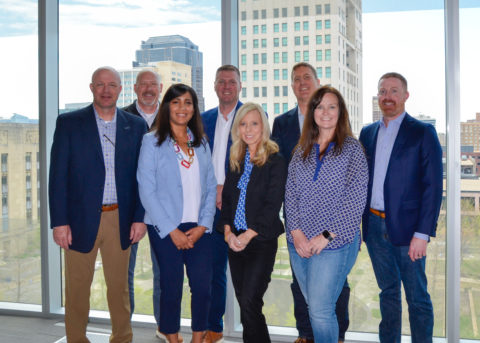 From the inception of this awards program in 2008, the gold standard of employment has been JE Dunn Construction, the largest contractor to call Kansas City home. It’s a civic champion as much as it is a national construction-services powerhouse, and it has long set standards for workplace design that inspire other companies, regardless of sector. Two years after that first recognition, JE Dunn introduced its employee stock-ownership plan, putting nearly a century of family ownership into the hands of those who helped build that success. It all starts, said marketing director Traci Clatterbuck, with a vision for the future based on growth, development, and opportunities for all employee-owners. The corporate strategy is honed through rigorous business and marketing planning each year, she says, with focused performance and development discussions. “In addition, managers participate in a yearlong course that teaches them the skills to serve in an individual contributor role, move into a management role and develop into strong leaders,” she said, a tactic that dovetails with efforts to identify top talent that will carry that growth forward. Talent development requires tools that promote personal as well as professional growth, including tuition reimbursement related to technical operations and leadership. Another is the robust catalog of instruction created by in-house learning professionals to give every employee the right content via the right vehicle at the right time in the flow of project work, she says. Employees can choose between two consumer-driven medical plans with prescription drug coverage and two dental plans, supplemented by a vision plan with an annual exam and choice of eyewear and safety glasses. A robust wellness program includes a company-paid annual wellness screening and wellness coaching. To encourage participation, employees who meet the requirements may qualify for medical premium discounts as well as annual deposits into a health care account. Pre-tax contributions are directed into health savings, medical and limited or dependent-care FSA accounts. Those working at least 24 hours a week qualify for basic life and AD&D benefits, with optional purchase of additional levels of coverage for employee, spouse, and children. The company pays 100 percent of premiums for short- and long-term disability, as well. To help plan for retirement, the 401(k) program provides a 50 percent match on the first 6 percent of annual salary set aside by employees; matching 401(k) contributions and discretionary profit-sharing are deposited into the ESOP plan. And time off includes seven paid holidays, up to seven health days per year, bereavement leave and parental leave.
From the inception of this awards program in 2008, the gold standard of employment has been JE Dunn Construction, the largest contractor to call Kansas City home. It’s a civic champion as much as it is a national construction-services powerhouse, and it has long set standards for workplace design that inspire other companies, regardless of sector. Two years after that first recognition, JE Dunn introduced its employee stock-ownership plan, putting nearly a century of family ownership into the hands of those who helped build that success. It all starts, said marketing director Traci Clatterbuck, with a vision for the future based on growth, development, and opportunities for all employee-owners. The corporate strategy is honed through rigorous business and marketing planning each year, she says, with focused performance and development discussions. “In addition, managers participate in a yearlong course that teaches them the skills to serve in an individual contributor role, move into a management role and develop into strong leaders,” she said, a tactic that dovetails with efforts to identify top talent that will carry that growth forward. Talent development requires tools that promote personal as well as professional growth, including tuition reimbursement related to technical operations and leadership. Another is the robust catalog of instruction created by in-house learning professionals to give every employee the right content via the right vehicle at the right time in the flow of project work, she says. Employees can choose between two consumer-driven medical plans with prescription drug coverage and two dental plans, supplemented by a vision plan with an annual exam and choice of eyewear and safety glasses. A robust wellness program includes a company-paid annual wellness screening and wellness coaching. To encourage participation, employees who meet the requirements may qualify for medical premium discounts as well as annual deposits into a health care account. Pre-tax contributions are directed into health savings, medical and limited or dependent-care FSA accounts. Those working at least 24 hours a week qualify for basic life and AD&D benefits, with optional purchase of additional levels of coverage for employee, spouse, and children. The company pays 100 percent of premiums for short- and long-term disability, as well. To help plan for retirement, the 401(k) program provides a 50 percent match on the first 6 percent of annual salary set aside by employees; matching 401(k) contributions and discretionary profit-sharing are deposited into the ESOP plan. And time off includes seven paid holidays, up to seven health days per year, bereavement leave and parental leave.
LMH Health
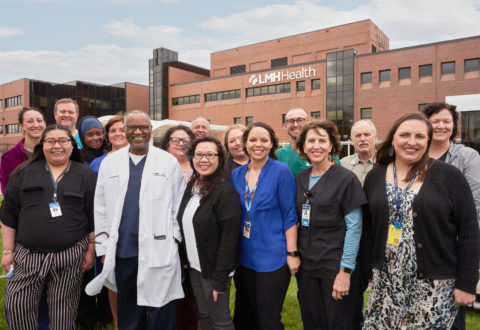 For LMH Health, one of the biggest employers in Lawrence, successful workplace design includes an intense focus on education. Competitive pay is just a starting point, and in this case, it’s grounded in the annual review of multiple markets to keep current. But for health care, in particular, education holds a special significance. With LMH, sources of instruction are both in-house and external. From the inside, managers, directors, and senior leaders experience monthly leadership training to help create an environment of support, equity, and accountability and to ingrain LMH Health’s cultural beliefs, says Colleen Browne, chief people officer. Those self-explanatory pillars are Patient First, Own It/Solve It, Better Together, Innovate!, Listen/Speak Up, and In Joy. “Additionally, all staff are encouraged to attend monthly wellness seminars, ID&E collaborative classes, and numerous other professional-development offerings,” she says. From outside sources, she says, “our commitment to employee career growth and professional development is seen in our numerous support and education programs.” That’s built on partnerships with local technical and training colleges, through which employees can become certified in fields like phlebotomy or sterile processing, or earn certification as a medical assistant or nursing aide—at no cost to those staffers. “For professional growth expanding even further beyond a technical skill set, we have secured tuition discounts with area universities and offer annual tuition reimbursement to help alleviate the cost of continuing education for our employees,” Browne says. “We are proud of the growth achieved by our staff, and we celebrate over 100 promotions annually.” That helps build a sense of cohesiveness among the system’s 1,951 employees, who serve roughly 8,000 patients admitted each year, and multiples of that in out-patient visits. That depth of service, Browne notes, pays dividends for the community. “LMH associates give day-to-day care to our surrounding communities, but they are also generous with their own time and resources in many ways throughout each year,” she says. “Our annual United Way of Douglas County campaign proves to be one of the program’s largest donation drives (competing with local employers five times our size).” To address long-term financial health for employees, the company contributes up to 4 percent of an employee’s salary to a retirement savings plan, based on years of service, and matches 50 cents for every $1 contributed, up to 4 percent of pay—a very healthy potential for saving the equivalent of 8 percent of pay each year.
For LMH Health, one of the biggest employers in Lawrence, successful workplace design includes an intense focus on education. Competitive pay is just a starting point, and in this case, it’s grounded in the annual review of multiple markets to keep current. But for health care, in particular, education holds a special significance. With LMH, sources of instruction are both in-house and external. From the inside, managers, directors, and senior leaders experience monthly leadership training to help create an environment of support, equity, and accountability and to ingrain LMH Health’s cultural beliefs, says Colleen Browne, chief people officer. Those self-explanatory pillars are Patient First, Own It/Solve It, Better Together, Innovate!, Listen/Speak Up, and In Joy. “Additionally, all staff are encouraged to attend monthly wellness seminars, ID&E collaborative classes, and numerous other professional-development offerings,” she says. From outside sources, she says, “our commitment to employee career growth and professional development is seen in our numerous support and education programs.” That’s built on partnerships with local technical and training colleges, through which employees can become certified in fields like phlebotomy or sterile processing, or earn certification as a medical assistant or nursing aide—at no cost to those staffers. “For professional growth expanding even further beyond a technical skill set, we have secured tuition discounts with area universities and offer annual tuition reimbursement to help alleviate the cost of continuing education for our employees,” Browne says. “We are proud of the growth achieved by our staff, and we celebrate over 100 promotions annually.” That helps build a sense of cohesiveness among the system’s 1,951 employees, who serve roughly 8,000 patients admitted each year, and multiples of that in out-patient visits. That depth of service, Browne notes, pays dividends for the community. “LMH associates give day-to-day care to our surrounding communities, but they are also generous with their own time and resources in many ways throughout each year,” she says. “Our annual United Way of Douglas County campaign proves to be one of the program’s largest donation drives (competing with local employers five times our size).” To address long-term financial health for employees, the company contributes up to 4 percent of an employee’s salary to a retirement savings plan, based on years of service, and matches 50 cents for every $1 contributed, up to 4 percent of pay—a very healthy potential for saving the equivalent of 8 percent of pay each year.
Alphapointe
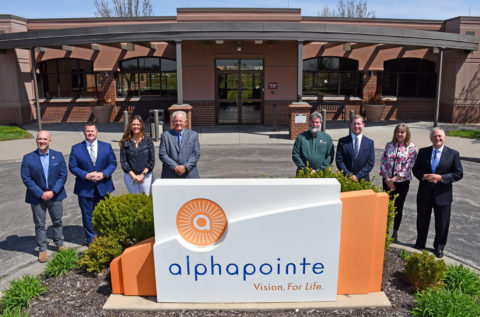 It’s hard enough to establish a high-functioning workplace under the best of circumstances. Now imagine trying it when the majority of your workforce is visually impaired, even blind. So it says something about commitment to a strong corporate culture that Alphapointe, with that workforce challenge, is thriving: Revenues have tripled over the past 15 years; they’ve doubled over the past decade. Clearly, Reinhold Mabry and his leadership team are doing something right. They set the tone for the entire organization by always focusing on the core mission of empowering people with vision loss, says Mike Vietti, marketing director. “Virtually all business decisions are made not by asking ‘How can we make money from this?’ Instead, the primary question is always ‘How many jobs for blind people will this create and how many blind people can we serve through our rehabilitation programs?’” The answer is quite a lot. Employees churn out tens of millions of products annually, making Alphapointe one of the largest employers of the blind, as well as one of the largest providers of low-vision rehabilitation services in the U.S. It is, Vietti says, “one of the region’s best examples for successfully combining fostering an enjoyable workplace with a genuinely purposeful mission that inspires its team members.” And it’s a vital employer niche being filled: The unemployment rate among the blind is typically above 70 percent. “The reality,” Vietti says, “is that people who are blind can do most things their sighted peers can do—they just do things differently.” Alphapointe answers that need with a variety of positions that require different skill sets, finding the right fit for people of all levels of visual impairment as well as people with no vision loss. That means a robust training program to raise skill levels and complementary training in areas that can truly make a difference in people’s lives—in adaptive technology, in orientation/mobility (how to use a cane, how to use public transportation), in Braille instruction, and in activities of daily living, such as cooking and cleaning, to retain independence. The company’s tuition-reimbursement program helps pay for college courses, and there’s an opportunity to earn while away from work by training with a new guide dog. That contributes to an average tenure of more than seven years for all employees; 55 percent of all staff have more than five years of service. Pay starts at the minimum-wage level or higher, and all full-time employees receive medical, dental, vision, and life insurance with the opportunity to participate in supplemental insurance policies. To assist with retirement savings, the company matches half of the employee contributions up to 4 percent of annual wages while also contributing 3 percent of the employee’s salary regardless of whether the employee makes a contribution.
It’s hard enough to establish a high-functioning workplace under the best of circumstances. Now imagine trying it when the majority of your workforce is visually impaired, even blind. So it says something about commitment to a strong corporate culture that Alphapointe, with that workforce challenge, is thriving: Revenues have tripled over the past 15 years; they’ve doubled over the past decade. Clearly, Reinhold Mabry and his leadership team are doing something right. They set the tone for the entire organization by always focusing on the core mission of empowering people with vision loss, says Mike Vietti, marketing director. “Virtually all business decisions are made not by asking ‘How can we make money from this?’ Instead, the primary question is always ‘How many jobs for blind people will this create and how many blind people can we serve through our rehabilitation programs?’” The answer is quite a lot. Employees churn out tens of millions of products annually, making Alphapointe one of the largest employers of the blind, as well as one of the largest providers of low-vision rehabilitation services in the U.S. It is, Vietti says, “one of the region’s best examples for successfully combining fostering an enjoyable workplace with a genuinely purposeful mission that inspires its team members.” And it’s a vital employer niche being filled: The unemployment rate among the blind is typically above 70 percent. “The reality,” Vietti says, “is that people who are blind can do most things their sighted peers can do—they just do things differently.” Alphapointe answers that need with a variety of positions that require different skill sets, finding the right fit for people of all levels of visual impairment as well as people with no vision loss. That means a robust training program to raise skill levels and complementary training in areas that can truly make a difference in people’s lives—in adaptive technology, in orientation/mobility (how to use a cane, how to use public transportation), in Braille instruction, and in activities of daily living, such as cooking and cleaning, to retain independence. The company’s tuition-reimbursement program helps pay for college courses, and there’s an opportunity to earn while away from work by training with a new guide dog. That contributes to an average tenure of more than seven years for all employees; 55 percent of all staff have more than five years of service. Pay starts at the minimum-wage level or higher, and all full-time employees receive medical, dental, vision, and life insurance with the opportunity to participate in supplemental insurance policies. To assist with retirement savings, the company matches half of the employee contributions up to 4 percent of annual wages while also contributing 3 percent of the employee’s salary regardless of whether the employee makes a contribution.
BASYS Processing
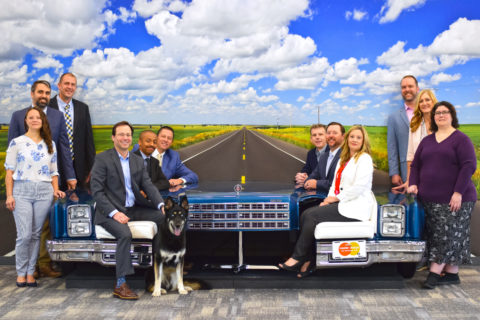 It’s not just an Aretha Franklin hit: R-E-S-P-E-C-T was at the core of workplace design from Day One at BASYS Processing. “BASYS was founded in 2002 guided by the principle of treating everyone with respect,” says marketing director Patrick Redd. “We’ve grown a lot since then, but we’re still a small business at heart; our culture and continued growth exemplify that.” That’s in large part because Brad Oddo, founder and CEO, “sees company culture as our No. 1 job,” Redd says. “With a great culture, he believes we can accomplish anything we set our minds to.” Indeed: BASYS grew more than year over year in 2021, making it one of the 20 largest card-not-present payment processors in the country. This year is shaping up even better. In 2020, the firm more than tripled its workplace footprint with a 54,000-square-foot, state-of-the-art headquarters, complete with a self-serve barista area with locally sourced coffee, gym, covered deck, treadmill desks, and more. Competitive pay is a baseline, upon which BASYS adds a 401(k) program with company match, flexible working arrangements, and a PTO policy that encompasses vacation and holidays, as well as maternity and parental leave, as one might expect from a family-owned business with an emphasis on work-life balance. “We offer healthy-lifestyle discounts and cover over 75 percent of individual employee insurance cost,” Redd says. Bolstering camaraderie are monthly food trucks or catered lunches, holiday celebrations, an annual employee-recognition party, and a preference for filling managerial positions from within—one reason for industry-leading retention not just with employees but clients and partners. Here’s a perk you don’t often find at companies of this size: Every five years, BASYS provides a vacation bonus to let employees make that special trip. It also encourages employees to develop their skills by providing online learning and development courses, a management training program, assistance with certifications, and other continuing education as applicable, Redd says. BASYS prioritizes giving back to the community, contributing more than six figures annually to multiple charities and philanthropic events, Redd says, and it appeals to staffers’ charitable instincts by making a $500 annual charitable donation in the employee’s name. “We are proud to differentiate ourselves from our competition by keeping over 90 percent of our clients that continue to process payments in an industry that often sees client retention 20 percent or more lower than ours,” Redd says. “We listen and treat our clients—and our own team—with respect, doing what it takes to be the best in our industry and one of the best in Kansas City.”
It’s not just an Aretha Franklin hit: R-E-S-P-E-C-T was at the core of workplace design from Day One at BASYS Processing. “BASYS was founded in 2002 guided by the principle of treating everyone with respect,” says marketing director Patrick Redd. “We’ve grown a lot since then, but we’re still a small business at heart; our culture and continued growth exemplify that.” That’s in large part because Brad Oddo, founder and CEO, “sees company culture as our No. 1 job,” Redd says. “With a great culture, he believes we can accomplish anything we set our minds to.” Indeed: BASYS grew more than year over year in 2021, making it one of the 20 largest card-not-present payment processors in the country. This year is shaping up even better. In 2020, the firm more than tripled its workplace footprint with a 54,000-square-foot, state-of-the-art headquarters, complete with a self-serve barista area with locally sourced coffee, gym, covered deck, treadmill desks, and more. Competitive pay is a baseline, upon which BASYS adds a 401(k) program with company match, flexible working arrangements, and a PTO policy that encompasses vacation and holidays, as well as maternity and parental leave, as one might expect from a family-owned business with an emphasis on work-life balance. “We offer healthy-lifestyle discounts and cover over 75 percent of individual employee insurance cost,” Redd says. Bolstering camaraderie are monthly food trucks or catered lunches, holiday celebrations, an annual employee-recognition party, and a preference for filling managerial positions from within—one reason for industry-leading retention not just with employees but clients and partners. Here’s a perk you don’t often find at companies of this size: Every five years, BASYS provides a vacation bonus to let employees make that special trip. It also encourages employees to develop their skills by providing online learning and development courses, a management training program, assistance with certifications, and other continuing education as applicable, Redd says. BASYS prioritizes giving back to the community, contributing more than six figures annually to multiple charities and philanthropic events, Redd says, and it appeals to staffers’ charitable instincts by making a $500 annual charitable donation in the employee’s name. “We are proud to differentiate ourselves from our competition by keeping over 90 percent of our clients that continue to process payments in an industry that often sees client retention 20 percent or more lower than ours,” Redd says. “We listen and treat our clients—and our own team—with respect, doing what it takes to be the best in our industry and one of the best in Kansas City.”
CrossFirst Bank
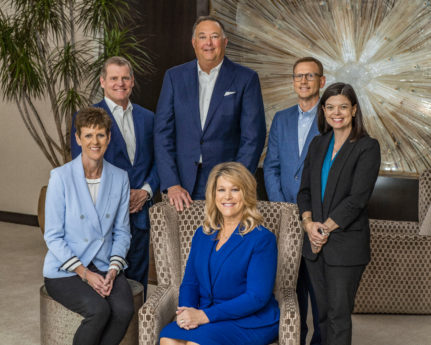 In banking terms, it’s still a pup: CrossFirst Bank was founded in 2007, and already, it’s the third-largest bank headquartered in Kansas, with $5.6 billion in assets. Sure, a good business plan helps, but the Leawood-based bank got where it is by hand-crafting a culture “built on trust, respect and an underlying commitment to our employees,” says Meggin Nilssen, chief of staff. To a staff now 368 strong, that culture gave a unified purpose: Extraordinary service. “To deliver on our purpose, each of our employees operates under four values that define our approach to banking,” Nilssen says. Specifically: Character, competence, commitment, and connection. They are not, she says, “just words at CrossFirst. They are core values that guide our actions, decisions, and vision. They define who we are.” That’s been key to growing more than 2,500 percent since the bank’s founding. You don’t become a market leader without a competitive salary structure, but CrossFirst doesn’t stop there: It picks up 60 percent of employee health-care premium costs, with high-deductible and PPO plans that can hold an individual employee’s bi-monthly health, vision, and dental costs to as little as $119. Health savings, flexible spending, and FSA Dependent Care accounts are available, and in addition to short- and long-term disability insurance, full-timers can enroll for life and AD&D coverage that maxes out at $500,000 in protection (with voluntary insurance layered over that). Maternity leave runs to a maximum of six weeks, and the retirement savings plans include a 401(k) with a robust 5 percent company match and a stock-purchase plan that provides a 15 percent discount on share prices. The bank also values strengthening relationships not just with its clients but between employees and organizations about which they are passionate. “We encourage our employees to volunteer their time and talent by serving on boards and supporting the communities where they live and work,” Nilssen said. “Helping our employees devote their energies to causes that matter to them, to their communities, and to those individuals who are most in need, makes a broader impact. Our CrossFirst Volunteer Time Off program provides paid leave for these volunteer activities.” On top of that, the spirit of employee giving is championed through the Generous Giving program. “Through this program, we offer every employee the opportunity to provide financial support for another individual by matching up to $500 per employee gift per year,” Nilsson says. “Our Generous Giving is designed to give our employees additional resources to make a difference in people’s lives. Giving back to the communities we serve and providing opportunities to our employees to share in that effort; we recognize that participating in these activities enriches all our lives.”
In banking terms, it’s still a pup: CrossFirst Bank was founded in 2007, and already, it’s the third-largest bank headquartered in Kansas, with $5.6 billion in assets. Sure, a good business plan helps, but the Leawood-based bank got where it is by hand-crafting a culture “built on trust, respect and an underlying commitment to our employees,” says Meggin Nilssen, chief of staff. To a staff now 368 strong, that culture gave a unified purpose: Extraordinary service. “To deliver on our purpose, each of our employees operates under four values that define our approach to banking,” Nilssen says. Specifically: Character, competence, commitment, and connection. They are not, she says, “just words at CrossFirst. They are core values that guide our actions, decisions, and vision. They define who we are.” That’s been key to growing more than 2,500 percent since the bank’s founding. You don’t become a market leader without a competitive salary structure, but CrossFirst doesn’t stop there: It picks up 60 percent of employee health-care premium costs, with high-deductible and PPO plans that can hold an individual employee’s bi-monthly health, vision, and dental costs to as little as $119. Health savings, flexible spending, and FSA Dependent Care accounts are available, and in addition to short- and long-term disability insurance, full-timers can enroll for life and AD&D coverage that maxes out at $500,000 in protection (with voluntary insurance layered over that). Maternity leave runs to a maximum of six weeks, and the retirement savings plans include a 401(k) with a robust 5 percent company match and a stock-purchase plan that provides a 15 percent discount on share prices. The bank also values strengthening relationships not just with its clients but between employees and organizations about which they are passionate. “We encourage our employees to volunteer their time and talent by serving on boards and supporting the communities where they live and work,” Nilssen said. “Helping our employees devote their energies to causes that matter to them, to their communities, and to those individuals who are most in need, makes a broader impact. Our CrossFirst Volunteer Time Off program provides paid leave for these volunteer activities.” On top of that, the spirit of employee giving is championed through the Generous Giving program. “Through this program, we offer every employee the opportunity to provide financial support for another individual by matching up to $500 per employee gift per year,” Nilsson says. “Our Generous Giving is designed to give our employees additional resources to make a difference in people’s lives. Giving back to the communities we serve and providing opportunities to our employees to share in that effort; we recognize that participating in these activities enriches all our lives.”
GBA Companies
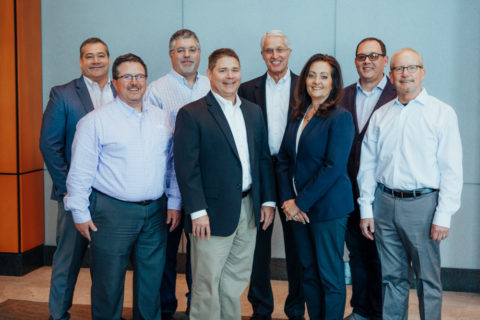 “We’re all part of a team. We must bury our egos, accept whatever task needs to be done, support each other and treat others as we want to be treated. If we can learn and practice these lessons, we will be successful.” — George Butler, GBA Founder
“We’re all part of a team. We must bury our egos, accept whatever task needs to be done, support each other and treat others as we want to be treated. If we can learn and practice these lessons, we will be successful.” — George Butler, GBA Founder
Far from the often mushy, grandiose prose of modern corporate mission statements, George Butler launched his company in 1969 by grounding its prospects for success in the simplest of terms. Hard to knock the results: From that opening-day staffing level of 10 people, GBA Companies now employs more than 400, witness to its success in branching out in related design disciplines, adding new markets across the nation, and making strategic acquisitions. Headquartered in Lenexa, it has regional offices in Colorado, Illinois, Missouri, Nebraska, North Carolina, Texas and Washington state. Employees are able to choose from medical, dental, vision and life insurance coverages, along with company-paid short-term disability insurance. The firm also provides a 401(k) retirement plan with both a company match and a discretionary profit-share contribution and potential performance bonuses. Recognition of work-balance needs includes vacation and sick leave, plus parental leave, bereavement leave and an employee wellness program, along with EAP. Flexible-work arrangements are available where appropriate. The focus on employee professional growth includes professional development support and tuition assistance, and the firm reimburses fees for employees to obtain and hold various technical and professional members. Jeans Day? Sure, on Fridays, but in this casual work environment, says marketing director Mackenzi Baum, “we wear them other days, too!” The culture at GBA, she says, is “one of the many reasons people want to work and stay at GBA. From Day One, GBA was built on a family mentality and a prioritization of collaboration, support and respect. Job satisfaction goes beyond the office walls and by recruiting and retaining talent with a variety of backgrounds, the company can encourage creativity and innovation. Regardless of position or tenure, the core values of GBA Companies are engrained in every employee so that the culture will always remain a top priority.” The firm strives to engage employees by helping them embrace the goals and mission of the company. One way to do that is with committees that give voice to employee concerns and draw on diverse perspectives that help shape that culture. The Work Environment Committee is an example of that, Baum says, as are the Diversity and Inclusion and the Philanthropy committees.
Midway Ford Truck Center
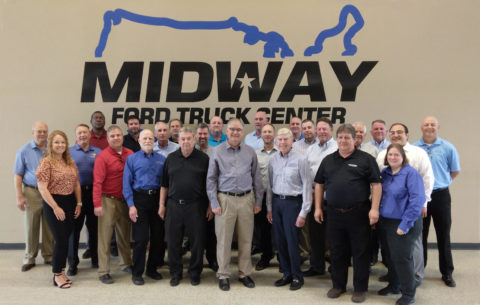 Shared ownership. Profitability. Employee engagement. Customer service. It all comes together at Midway Ford Truck Center, where nearly 280 employees drove the growth of better than 21 percent in 2021. The compensation structure starts with above-average pay levels, to which Midway adds a 401(k) retirement multiple insurance options with health, dental and vision plans, group term life and AD&D coverage, both short- and long-term disability insurance, and voluntary coverage for those seeking additional security. Looking for more? How about an employee assistance program, an annual health fair, and health and wellness programs? There are referral bonus programs, up to four weeks of paid vacation, holiday pay, and unlimited accumulating sick pay, the unused portion of which is paid out to retiring employees. Midway was Ford Motor Co.’s first commercial truck-only dealership when it launched in 1961, and a founding principle was a belief that employee satisfaction would produce customer satisfaction that could be measured in repeat truck sales. Two decades after its founding, Midway became Ford’s first ESOP dealership in the U.S., with dramatic results: Funded 100 percent by the company (to the tune of $19 million over the past 40 years), the ESOP balance has grown to $35.5 million, despite paying out millions in benefits. Ownership is restricted to current employees and the ESOP, which owns 44 percent of total common stock; 25 current managers own the balance. Those factors add up to worker loyalty, with almost half of the staff continuously employed at Midway for 10 years and nearly one-fourth of them for at least 25 years. The model works for Ford, as well—the company recently assigned Midway its President’s Award for customer satisfaction for the 22nd year in a row and 25th overall. The dealership has won multiple other Ford honors, including the 2021 Triple Crown, which goes to those receiving the President’s Award, the Premier Club Award for Ford Protect, and the Major Fleet Sales Award all in the same year. That kind of performance is why Midway has been profitable every year for the past six decades. In 2021, Midway delivered 13,217 new trucks and 498 used trucks and generated revenues in excess of $677 million, bouncing back strongly after the initial pandemic year. Organizational success, Andrews says, stems from a business operating model by which employee-owners are empowered to make decisions to ensure high customer satisfaction. “Shared ownership, as well as expanded decision-making authority, have encouraged Midway to innovate in many areas of its business,” she says.
Shared ownership. Profitability. Employee engagement. Customer service. It all comes together at Midway Ford Truck Center, where nearly 280 employees drove the growth of better than 21 percent in 2021. The compensation structure starts with above-average pay levels, to which Midway adds a 401(k) retirement multiple insurance options with health, dental and vision plans, group term life and AD&D coverage, both short- and long-term disability insurance, and voluntary coverage for those seeking additional security. Looking for more? How about an employee assistance program, an annual health fair, and health and wellness programs? There are referral bonus programs, up to four weeks of paid vacation, holiday pay, and unlimited accumulating sick pay, the unused portion of which is paid out to retiring employees. Midway was Ford Motor Co.’s first commercial truck-only dealership when it launched in 1961, and a founding principle was a belief that employee satisfaction would produce customer satisfaction that could be measured in repeat truck sales. Two decades after its founding, Midway became Ford’s first ESOP dealership in the U.S., with dramatic results: Funded 100 percent by the company (to the tune of $19 million over the past 40 years), the ESOP balance has grown to $35.5 million, despite paying out millions in benefits. Ownership is restricted to current employees and the ESOP, which owns 44 percent of total common stock; 25 current managers own the balance. Those factors add up to worker loyalty, with almost half of the staff continuously employed at Midway for 10 years and nearly one-fourth of them for at least 25 years. The model works for Ford, as well—the company recently assigned Midway its President’s Award for customer satisfaction for the 22nd year in a row and 25th overall. The dealership has won multiple other Ford honors, including the 2021 Triple Crown, which goes to those receiving the President’s Award, the Premier Club Award for Ford Protect, and the Major Fleet Sales Award all in the same year. That kind of performance is why Midway has been profitable every year for the past six decades. In 2021, Midway delivered 13,217 new trucks and 498 used trucks and generated revenues in excess of $677 million, bouncing back strongly after the initial pandemic year. Organizational success, Andrews says, stems from a business operating model by which employee-owners are empowered to make decisions to ensure high customer satisfaction. “Shared ownership, as well as expanded decision-making authority, have encouraged Midway to innovate in many areas of its business,” she says.
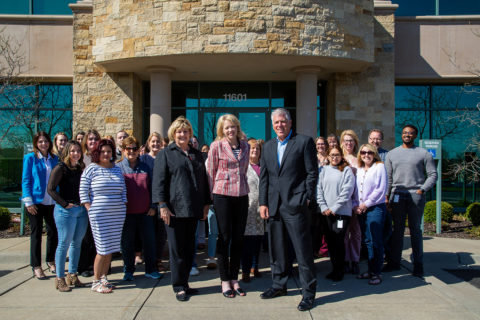 These days, it’s a given that everyone in the stratosphere of Best Companies to Work For will have a robust diversity and inclusion aspect to workplace design. But how many of those companies turn the focus of those efforts around to directly benefit their clientele? That’s where ReeceNichols, the dominant name in residential real estate transactions in this market, is making a difference. John Kurtz, communications specialist for ReeceNichols, says the firm’s Community Agents in Action program works with various minority groups to provide the resources and education that will empower people to become homeowners. A recent partnership with Juneteenth KC, for example, sparked a series of homeownership workshops for the black community; the Hispanic Initiative Latino Team has partnered with organizations like Univision Kansas City and the Mexican consulate to help Latinos acquire essential homeownership education and information, he said. In that way, their work isn’t just good for business—it’s extending the promise of the American Dream to many. The 240 employees in the corporate office help process the efforts of more than 3,000 agents in Missouri and Kansas, “and business is as strong as ever,” Kurtz says. “Not only did the company have a record year in 2021 with over $8 billion in sales closed and 20,000 homes sold,” he said, “but its parent company, HomeServices of America, was also named the No. 1 real estate company in the country by homes sold, according to RealTrends—considered a leading source of analysis and information on the real estate industry.” The tone for success, Kurtz says, is set with accessible leaders in president/CEO Mike Frazier and COO Amy Ringsdorf. Baby showers, birthday celebrations, and the occasional impromptu happy hours are nice touches, but where ReeceNichols commands attention as an employer is with its competitive compensation package, backed by market research to maintain its status for full-time employees. The 401(k) retirement plan stands out for its 50 percent company match on up to 8 percent of an employee’s pay, and it covers 80 percent of the cost of medical insurance. Dental, vision, life, short-term disability, and long-term disability insurance are also offered, and employees enjoy nine paid holidays; add three weeks of leave for new parents. Where applicable, employees in some departments can work a hybrid schedule. With its philanthropy, ReeceNichols has a standout initiative called the Gold Key Project. From April through October, more than 300 agents donate $100 from every transaction to Ronald McDonald House Charities—enough for one night’s stay for a family with a child receiving critical medical care,” Kurtz says. Last year, agents raised $272,900, enough to provide more than 2,000 of those free nights.
These days, it’s a given that everyone in the stratosphere of Best Companies to Work For will have a robust diversity and inclusion aspect to workplace design. But how many of those companies turn the focus of those efforts around to directly benefit their clientele? That’s where ReeceNichols, the dominant name in residential real estate transactions in this market, is making a difference. John Kurtz, communications specialist for ReeceNichols, says the firm’s Community Agents in Action program works with various minority groups to provide the resources and education that will empower people to become homeowners. A recent partnership with Juneteenth KC, for example, sparked a series of homeownership workshops for the black community; the Hispanic Initiative Latino Team has partnered with organizations like Univision Kansas City and the Mexican consulate to help Latinos acquire essential homeownership education and information, he said. In that way, their work isn’t just good for business—it’s extending the promise of the American Dream to many. The 240 employees in the corporate office help process the efforts of more than 3,000 agents in Missouri and Kansas, “and business is as strong as ever,” Kurtz says. “Not only did the company have a record year in 2021 with over $8 billion in sales closed and 20,000 homes sold,” he said, “but its parent company, HomeServices of America, was also named the No. 1 real estate company in the country by homes sold, according to RealTrends—considered a leading source of analysis and information on the real estate industry.” The tone for success, Kurtz says, is set with accessible leaders in president/CEO Mike Frazier and COO Amy Ringsdorf. Baby showers, birthday celebrations, and the occasional impromptu happy hours are nice touches, but where ReeceNichols commands attention as an employer is with its competitive compensation package, backed by market research to maintain its status for full-time employees. The 401(k) retirement plan stands out for its 50 percent company match on up to 8 percent of an employee’s pay, and it covers 80 percent of the cost of medical insurance. Dental, vision, life, short-term disability, and long-term disability insurance are also offered, and employees enjoy nine paid holidays; add three weeks of leave for new parents. Where applicable, employees in some departments can work a hybrid schedule. With its philanthropy, ReeceNichols has a standout initiative called the Gold Key Project. From April through October, more than 300 agents donate $100 from every transaction to Ronald McDonald House Charities—enough for one night’s stay for a family with a child receiving critical medical care,” Kurtz says. Last year, agents raised $272,900, enough to provide more than 2,000 of those free nights.
Dynamic Logistix
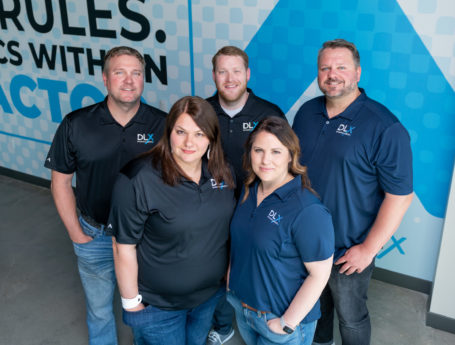 If you want teamwork baked into the cake of company culture, you start with ingredients like an “Us and We” mindset. That, says HR Director Kristan Stanley, is the foundation upon which Dynamic Logistix was built. “When one of us succeeds, we all succeed,” she says. “The values embedded in our company’s culture reflect the genuine, lasting friendships formed between employees and the meaningful partnerships we’ve established with our clients” at the transportation-services company. The proof of this approach can be found in the numbers: A mere pup in corporate years—it was founded in 2012—the company roared past the nine-figure revenue mark in 2021, surpassing $151 million. As a result, it’s been expanding its staff, now at 94, so this will be its last year in the small-company category. The other ingredients that go into creating that kind of momentum include management practices, such as open communication and attention to physical space, as with the open floor plan with the recent headquarters relocation. Within that framework, regular one-on-one conversations between employees and managers, ad-hoc and quarterly town hall meetings with the company leadership, and daily scorecards all drive competition and camaraderie. “Communication is an integral part of the success and growth DLX has accomplished over the past five years,” Stanley says. That still leaves room for balance, whether that means stepping away to work on the office patio, breaking a sweat in the on-site gym, or a game of ping-pong and darts. No clock-watching: If you need a break, take a break. If the work-life balance is right, it benefits employees, their families, and as a result, the company, Stanley says, so success is measured in terms of meeting deadlines and being able to spend valuable time with friends and family. Compensation starts with a competitive salary structure, multiple health-care insurance options, flexible spending accounts, and a company match to employee 401(k) contributions, starting the first of the month after the date of hire. DLX has a firm commitment to flexible work schedules, in the belief that they increase employee retention, loyalty, productivity, and engagement. The same goes for growth and development, which will be a key consideration as the company moves to double the size of its workforce following the office relocation. And there are opportunities for employees to make an impact outside of the office, but through it: Each department has quarterly outings that include volunteer opportunities, and DLX has sponsored the Infants and Toddlers golf tournament, assembled hygiene kits for the homeless, and donated to numerous organizations in the Kansas City area.
If you want teamwork baked into the cake of company culture, you start with ingredients like an “Us and We” mindset. That, says HR Director Kristan Stanley, is the foundation upon which Dynamic Logistix was built. “When one of us succeeds, we all succeed,” she says. “The values embedded in our company’s culture reflect the genuine, lasting friendships formed between employees and the meaningful partnerships we’ve established with our clients” at the transportation-services company. The proof of this approach can be found in the numbers: A mere pup in corporate years—it was founded in 2012—the company roared past the nine-figure revenue mark in 2021, surpassing $151 million. As a result, it’s been expanding its staff, now at 94, so this will be its last year in the small-company category. The other ingredients that go into creating that kind of momentum include management practices, such as open communication and attention to physical space, as with the open floor plan with the recent headquarters relocation. Within that framework, regular one-on-one conversations between employees and managers, ad-hoc and quarterly town hall meetings with the company leadership, and daily scorecards all drive competition and camaraderie. “Communication is an integral part of the success and growth DLX has accomplished over the past five years,” Stanley says. That still leaves room for balance, whether that means stepping away to work on the office patio, breaking a sweat in the on-site gym, or a game of ping-pong and darts. No clock-watching: If you need a break, take a break. If the work-life balance is right, it benefits employees, their families, and as a result, the company, Stanley says, so success is measured in terms of meeting deadlines and being able to spend valuable time with friends and family. Compensation starts with a competitive salary structure, multiple health-care insurance options, flexible spending accounts, and a company match to employee 401(k) contributions, starting the first of the month after the date of hire. DLX has a firm commitment to flexible work schedules, in the belief that they increase employee retention, loyalty, productivity, and engagement. The same goes for growth and development, which will be a key consideration as the company moves to double the size of its workforce following the office relocation. And there are opportunities for employees to make an impact outside of the office, but through it: Each department has quarterly outings that include volunteer opportunities, and DLX has sponsored the Infants and Toddlers golf tournament, assembled hygiene kits for the homeless, and donated to numerous organizations in the Kansas City area.
AdamsGabbert
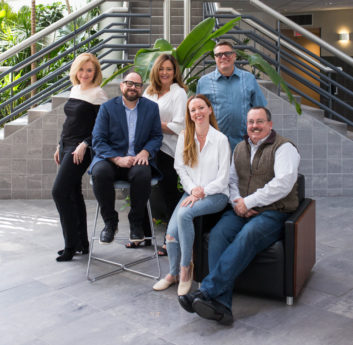 At AdamsGabbert, placing culture first starts by offering exceptional employee benefits that support the whole person and by matching employees to work that aligns with their purpose. “We take a family-first approach to promote an award-winning company culture,” says CEO Denise Kruse. “Through employee benefits and activities such as unlimited PTO, paid holidays, a 401(k) match program, full health-care coverage, annual bonus opportunities, social memberships, and community engagement, we encourage employees to engage in life outside of work and be active participants in our community.” That life outside work also includes nice touches like fully paid family gym memberships for each employee at Brookridge Golf & Fitness and free subscriptions for employees’ choices of applications, from wellness apps like Premium Fitness Pal and Calm or an Audible subscription. This is no drab office dynamic—heck, with a Chief Happiness Officer on staff, how could it be? In this case, it’s Sweeney, the four-legged office mascot. “We strive to create an environment of trust and respect, so each employee feels fulfilled and empowered in their career and beyond,” says Kruse. “Our distinguishing approach to management stems from our focus on unlocking meaningful experiences for our clients, candidates. and employees,” she says. “This sets us apart from our competitors because our internal work and our work with clients are purpose-driven rather than purely tactical, which allows us to attract and retain phenomenal talent.” In the time of the post-pandemic Great Resignation, she says, the ability to fully retain employees who meet the goals and needs of clients has been a key differentiator. To promote development for a staff of 69 people, the firm provides year-round feedback and weekly one-on-ones, which maintain clear and open channels of communication. And employee satisfaction is measured through an annual survey. There’s also a continuing education program through JOCO Works and Johnson County Community College which covers tuition and certification costs for classes. Job candidates seeking an employer with a strong commitment to making a difference will find AdamsGabbert engaged with volunteer efforts that support a number of causes—the KC Pet Project, the Ronald McDonald House, the Queens of the Diamonds event through the Kansas City Urban Youth Academy, and the Take Defense program through the Ali Kemp Foundation.
At AdamsGabbert, placing culture first starts by offering exceptional employee benefits that support the whole person and by matching employees to work that aligns with their purpose. “We take a family-first approach to promote an award-winning company culture,” says CEO Denise Kruse. “Through employee benefits and activities such as unlimited PTO, paid holidays, a 401(k) match program, full health-care coverage, annual bonus opportunities, social memberships, and community engagement, we encourage employees to engage in life outside of work and be active participants in our community.” That life outside work also includes nice touches like fully paid family gym memberships for each employee at Brookridge Golf & Fitness and free subscriptions for employees’ choices of applications, from wellness apps like Premium Fitness Pal and Calm or an Audible subscription. This is no drab office dynamic—heck, with a Chief Happiness Officer on staff, how could it be? In this case, it’s Sweeney, the four-legged office mascot. “We strive to create an environment of trust and respect, so each employee feels fulfilled and empowered in their career and beyond,” says Kruse. “Our distinguishing approach to management stems from our focus on unlocking meaningful experiences for our clients, candidates. and employees,” she says. “This sets us apart from our competitors because our internal work and our work with clients are purpose-driven rather than purely tactical, which allows us to attract and retain phenomenal talent.” In the time of the post-pandemic Great Resignation, she says, the ability to fully retain employees who meet the goals and needs of clients has been a key differentiator. To promote development for a staff of 69 people, the firm provides year-round feedback and weekly one-on-ones, which maintain clear and open channels of communication. And employee satisfaction is measured through an annual survey. There’s also a continuing education program through JOCO Works and Johnson County Community College which covers tuition and certification costs for classes. Job candidates seeking an employer with a strong commitment to making a difference will find AdamsGabbert engaged with volunteer efforts that support a number of causes—the KC Pet Project, the Ronald McDonald House, the Queens of the Diamonds event through the Kansas City Urban Youth Academy, and the Take Defense program through the Ali Kemp Foundation.
Crux KC
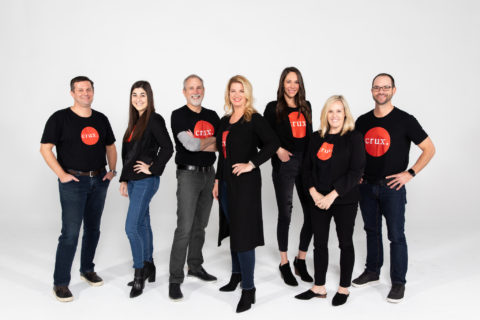 The Mighty Mite of this year’s Best Companies to Work For is Crux KC, with just 33 employees. But the five-year-old marketing specialist is flexing big-time: That employee count has more than doubled over the past year as it added firepower to the leadership ranks, and it will soon relocate from the Freighthouse District to digs twice the current size in the 2345 Grand Building. Crux KC is fulfilling founder Melea McCrea’s vision of the “un-agency,” combining the leadership of a fractional CMO with a marketing-department-as-a-service model. The goal is to provide simple, smart, and affordable marketing solutions for clients, allowing her team members “to integrate more fully into its clients’ organizations and to work more closely alongside their leadership teams to provide more robust strategy and deliverables.” The foundation for workplace culture is found in a values-based, eight-letter acronym: TEAM CRUX. Specifically: “Trusting, Entrepreneurial, Accountable, Motivated, Collaborative, Respectful, Unrelenting and X-ceptional.” OK, we’ll give them a pass on that last one. “We’ve developed a leadership team to lead the company into the future by coaching, training, and mentoring the next generation as they enter the workforce to grow personally and professionally,” says vice president Kara Brooks. That means the development of a robust onboarding process to ensure retention of new hires, she says, along with leadership traits, giving the broader team a chance to offer feedback guided by those traits. “This process,” Brooks says, “has helped us to develop a culture of trust, communication, accountability, and results.” That’s the philosophical; the practical starts with a competitive compensation by giving every employee, at every level, the shot to earn a bonus in 2022. Work-from-home Wednesdays are a nice way to break up the Monday-to-Friday routine, and $50 gift cards go out to each Employee of the Month. The 401(k) plan has a company match equivalent to up to 3 percent of an employee’s contributions. On the training side, Crux provides advancement and development opportunities, professional development with assigned budgets across the organization, and monthly lunch and learns to share industry knowledge. Outside guest speakers further educate the team on topics such as financial literacy, company culture, and diversity and inclusion. “This year,” says Brooks, “we’re creating a focus on wellness, bringing onboard a Chief Wellbeing Officer to hold workshops, provide mentorship and help the team focus on resiliency and work-life balance.” And a culture of community connection sprouts from Crux for a Cause, a 2020 initiative that provides $30,000 in marketing services annually to one deserving non-profit.
The Mighty Mite of this year’s Best Companies to Work For is Crux KC, with just 33 employees. But the five-year-old marketing specialist is flexing big-time: That employee count has more than doubled over the past year as it added firepower to the leadership ranks, and it will soon relocate from the Freighthouse District to digs twice the current size in the 2345 Grand Building. Crux KC is fulfilling founder Melea McCrea’s vision of the “un-agency,” combining the leadership of a fractional CMO with a marketing-department-as-a-service model. The goal is to provide simple, smart, and affordable marketing solutions for clients, allowing her team members “to integrate more fully into its clients’ organizations and to work more closely alongside their leadership teams to provide more robust strategy and deliverables.” The foundation for workplace culture is found in a values-based, eight-letter acronym: TEAM CRUX. Specifically: “Trusting, Entrepreneurial, Accountable, Motivated, Collaborative, Respectful, Unrelenting and X-ceptional.” OK, we’ll give them a pass on that last one. “We’ve developed a leadership team to lead the company into the future by coaching, training, and mentoring the next generation as they enter the workforce to grow personally and professionally,” says vice president Kara Brooks. That means the development of a robust onboarding process to ensure retention of new hires, she says, along with leadership traits, giving the broader team a chance to offer feedback guided by those traits. “This process,” Brooks says, “has helped us to develop a culture of trust, communication, accountability, and results.” That’s the philosophical; the practical starts with a competitive compensation by giving every employee, at every level, the shot to earn a bonus in 2022. Work-from-home Wednesdays are a nice way to break up the Monday-to-Friday routine, and $50 gift cards go out to each Employee of the Month. The 401(k) plan has a company match equivalent to up to 3 percent of an employee’s contributions. On the training side, Crux provides advancement and development opportunities, professional development with assigned budgets across the organization, and monthly lunch and learns to share industry knowledge. Outside guest speakers further educate the team on topics such as financial literacy, company culture, and diversity and inclusion. “This year,” says Brooks, “we’re creating a focus on wellness, bringing onboard a Chief Wellbeing Officer to hold workshops, provide mentorship and help the team focus on resiliency and work-life balance.” And a culture of community connection sprouts from Crux for a Cause, a 2020 initiative that provides $30,000 in marketing services annually to one deserving non-profit.
SpecChem
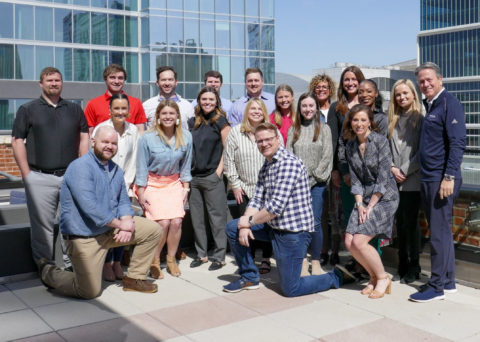 With six concrete chemical plants spread over a five-state area, the challenge Greg Maday’s leadership team confronts to create a unified culture at SpecChem is self-evident. And it’s getting bigger, it seems, by the year. The company, which produces the goods needed for the construction industry to do its thing, acquired an additional manufacturing plant in 2021, with the additional staff numbers pushing it just beyond the small-company threshold. But it was a huge strategic acquisition: in its wake, sales increased approximately 51 percent year-over-year, and they are projected to grow an additional 25 percent in 2022, Maday says. Thus, the focus remains on the people who make it happen and on providing opportunities to associates at every level through growth, compensation and benefits, and stability. Maday is a fierce believer in the need for a company culture that promotes such growth. So at SpecChem, leadership at all levels embraces respect for each team, and that’s reflected in the benefits provided and personal interactions at all levels. The benefits package has a strong base with comprehensive health, dental, vision, and life insurance for each associate—and the company covers 70 percent of the related costs. The paid-time-off policy includes a free day off, along with a personal gift, for associates’ birthdays. Each of the 123 employees receives annual recognition for years of service, and company events are back on the calendar as the worst of the pandemic seems to be behind us. Among those are family events in the summer and fall, holiday parties for every location, and, when available, tickets to local venues for concerts and sporting events. SpecChem also regularly provides lunch at the plants and corporate office. In-house development is prized, and as associates are given every opportunity to showcase their skill sets, the payoff comes with entry-level-to-leadership success: The national operations director, operations lead, purchasing manager, and financial operations director all reached those positions after starting in entry-level roles. “Performance is recognized through growth and compensation, and it is not just something we talk about,” Maday says. The leadership team makes regular visits to plant locations to keep a pulse on the associates who do not interact with them daily, and each visit includes an update on the state of the company and open Q&A with Maday and Mike Shull, the company president. Packing plenty of philanthropic punch for its size, SpecChem contributes directly to charitable organizations, and at year-end, each associate receives a giving card to choose where a portion of those funds land in the community. The formula is simple: The company takes the total number of years of service and multiplies it by 1,000, then splits those dollars evenly to every associate to donate to the charities of their choice, which gives everyone an opportunity to give within their communities.
With six concrete chemical plants spread over a five-state area, the challenge Greg Maday’s leadership team confronts to create a unified culture at SpecChem is self-evident. And it’s getting bigger, it seems, by the year. The company, which produces the goods needed for the construction industry to do its thing, acquired an additional manufacturing plant in 2021, with the additional staff numbers pushing it just beyond the small-company threshold. But it was a huge strategic acquisition: in its wake, sales increased approximately 51 percent year-over-year, and they are projected to grow an additional 25 percent in 2022, Maday says. Thus, the focus remains on the people who make it happen and on providing opportunities to associates at every level through growth, compensation and benefits, and stability. Maday is a fierce believer in the need for a company culture that promotes such growth. So at SpecChem, leadership at all levels embraces respect for each team, and that’s reflected in the benefits provided and personal interactions at all levels. The benefits package has a strong base with comprehensive health, dental, vision, and life insurance for each associate—and the company covers 70 percent of the related costs. The paid-time-off policy includes a free day off, along with a personal gift, for associates’ birthdays. Each of the 123 employees receives annual recognition for years of service, and company events are back on the calendar as the worst of the pandemic seems to be behind us. Among those are family events in the summer and fall, holiday parties for every location, and, when available, tickets to local venues for concerts and sporting events. SpecChem also regularly provides lunch at the plants and corporate office. In-house development is prized, and as associates are given every opportunity to showcase their skill sets, the payoff comes with entry-level-to-leadership success: The national operations director, operations lead, purchasing manager, and financial operations director all reached those positions after starting in entry-level roles. “Performance is recognized through growth and compensation, and it is not just something we talk about,” Maday says. The leadership team makes regular visits to plant locations to keep a pulse on the associates who do not interact with them daily, and each visit includes an update on the state of the company and open Q&A with Maday and Mike Shull, the company president. Packing plenty of philanthropic punch for its size, SpecChem contributes directly to charitable organizations, and at year-end, each associate receives a giving card to choose where a portion of those funds land in the community. The formula is simple: The company takes the total number of years of service and multiplies it by 1,000, then splits those dollars evenly to every associate to donate to the charities of their choice, which gives everyone an opportunity to give within their communities.
Sethmar Transportation
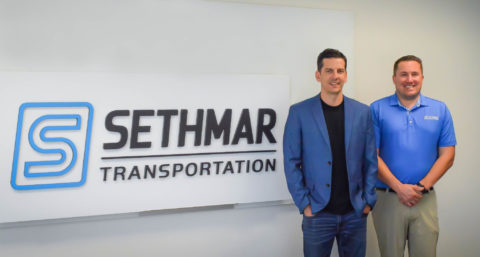 Hiring 10 people within five months is par for the course at larger companies, but at Sethmar Transportation’s scale, that’s a 20 percent pop in employee count in a short time frame. Imagine the impact of 200 new hires at a 1,000-employee organization, and you see the potential for impact on a carefully designed workplace culture at this Overland Park freight brokerage. In addition to the hiring burst, says founder Ben Bolan, the company has “streamlined our operations, migrated to a new operating system, and built our scalable processes to support a much larger sales presence. We have adopted technology to cover blind spots and empowered our people to really turbocharge Sethmar’s business.” Kansas City has been a hot spot for logistics growth over the past decade in particular, and a key factor in building a workforce isn’t just attracting talent—hello, competitive salaries—but retaining them with a solid suite of benefits one might expect from a considerably larger employer. For one, benefit eligibility starts with those working 30 hours a week, and they are able to select from three health-care plans, including a PPO and high-deductible plan, as well as a health savings account option. The plans include competitive deductible levels, with 100 percent coverage after those are met, and it has prescription-drug coverage, to boot. For a company in the small-business category, Sethmar stands tall with vision and dental plans, flexible spending accounts, fully paid life and AD&D insurance with a $25,000 benefit (with optional coverage for family), disability insurance, and Employee Assistance Program. To promote camaraderie, there are beer Fridays, goal-attainment awards, the annual Sethmar bowling Tournament, and a community-service program whereby team members volunteer as a group at one project each quarter, and the cause is selected by an employee vote. So far this year, that work has benefitted Harvesters-The Community Food Network, with employees stepping up to help at organizations including Thelma’s Kitchen, Habitat for Humanity, and Ronald McDonald House. “Of course, with COVID, opportunities are limited with being able to volunteer time,” Bolan says. “We hope that changes soon, so we are able to get out there as a team and support our community. It is important to focus our interest on what is meaningful to our people. We have a deep sense of pride in Kansas City and are extremely excited to be able to connect and give back to the city.” With all of those tools in hand, Bolan says, “we will continue to adapt and thrive due to hiring, training and compensating the best of the best people we can find. People will help us navigate the market and evolve with new products and ideas. Coupled with the right blend of technology to support it, we think we have the right blueprint to build out a business that helps reshape what a modern brokerage is.”
Hiring 10 people within five months is par for the course at larger companies, but at Sethmar Transportation’s scale, that’s a 20 percent pop in employee count in a short time frame. Imagine the impact of 200 new hires at a 1,000-employee organization, and you see the potential for impact on a carefully designed workplace culture at this Overland Park freight brokerage. In addition to the hiring burst, says founder Ben Bolan, the company has “streamlined our operations, migrated to a new operating system, and built our scalable processes to support a much larger sales presence. We have adopted technology to cover blind spots and empowered our people to really turbocharge Sethmar’s business.” Kansas City has been a hot spot for logistics growth over the past decade in particular, and a key factor in building a workforce isn’t just attracting talent—hello, competitive salaries—but retaining them with a solid suite of benefits one might expect from a considerably larger employer. For one, benefit eligibility starts with those working 30 hours a week, and they are able to select from three health-care plans, including a PPO and high-deductible plan, as well as a health savings account option. The plans include competitive deductible levels, with 100 percent coverage after those are met, and it has prescription-drug coverage, to boot. For a company in the small-business category, Sethmar stands tall with vision and dental plans, flexible spending accounts, fully paid life and AD&D insurance with a $25,000 benefit (with optional coverage for family), disability insurance, and Employee Assistance Program. To promote camaraderie, there are beer Fridays, goal-attainment awards, the annual Sethmar bowling Tournament, and a community-service program whereby team members volunteer as a group at one project each quarter, and the cause is selected by an employee vote. So far this year, that work has benefitted Harvesters-The Community Food Network, with employees stepping up to help at organizations including Thelma’s Kitchen, Habitat for Humanity, and Ronald McDonald House. “Of course, with COVID, opportunities are limited with being able to volunteer time,” Bolan says. “We hope that changes soon, so we are able to get out there as a team and support our community. It is important to focus our interest on what is meaningful to our people. We have a deep sense of pride in Kansas City and are extremely excited to be able to connect and give back to the city.” With all of those tools in hand, Bolan says, “we will continue to adapt and thrive due to hiring, training and compensating the best of the best people we can find. People will help us navigate the market and evolve with new products and ideas. Coupled with the right blend of technology to support it, we think we have the right blueprint to build out a business that helps reshape what a modern brokerage is.”
Spotlight Analyst Relations
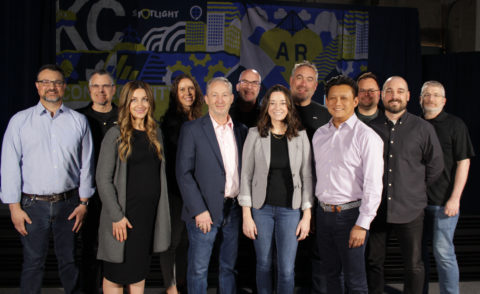 A sizeable number of attributes define Spotlight as one of the best companies to work for, but, really, they had us with this one: No meetings after 2 p.m. every Friday, so employees who have finished up can get a jump on the weekend, have a happy hour with colleagues, volunteer, or spend time with family and friends. The Crossroads-based business consulting and analytics firm, with 133 employees, is a relative newcomer to the Kansas City business scene, but it’s making a splash as an employer with a comprehensive workplace design that can attract and retain talent. Start financial health with the competitive pay and a powerful set of benefits that include medical, dental, and vision insurance, flexible spending and health spending accounts, long- and short-term disability coverage, life and AD&D, critical illness, and accident protection. The 401(k) program matches up to 4 percent of an employee’s annual salary, and the Spotlight Growth Share Program, a Unit Appreciation Rights plan, builds wealth as the value of the company increases. On the physical-health side, employees (and families) can save on fitness plans through Chiefs Fit and Class Pass, and Spotlight pays for employee access to a wellness coach and an individualized wellness plan. What about paid leave? The PTO comes with no limits for those meeting their work obligations, which can be in-house or flex, and this year, Spotlight also introduced its new and improved parental leave policy, including surrogacy and adoptions, at 16 consecutive weeks of fully paid leave for the primary caregiver, and six for the secondary caregiver. Wrap all of that up in a workplace construct defined by the leadership’s commitment to clear, open, and transparent communication, and you have a job-filling magnet. Quarterly all-employee meetings explore company strategy and progress toward goals, and the Employee Experience Committee of six employees works to advance key initiatives and make sure the voices of Spotlighters are heard on important topics, with missions addressing community enrichment, health and wellness, flexible work and workplace fun. In a niche industry, it’s vital to have a strong onboarding and training regimen for new hires, and Spotlight’s covers the first 90 days, then addresses leadership development with early-career employees, those new to managing people, and emerging and established leaders. Employee retention topped 90 percent in 2021, thanks in part to an average promotion time of just 18 months. After a big deliverable, employees are strongly encouraged to take a “Me Day” to decompress and relax, and all employees can take advantage of flex work arrangements. Then there are the unlimited snacks, beverages and free lunch on the first Friday of each month—well before 2 p.m., of course.
A sizeable number of attributes define Spotlight as one of the best companies to work for, but, really, they had us with this one: No meetings after 2 p.m. every Friday, so employees who have finished up can get a jump on the weekend, have a happy hour with colleagues, volunteer, or spend time with family and friends. The Crossroads-based business consulting and analytics firm, with 133 employees, is a relative newcomer to the Kansas City business scene, but it’s making a splash as an employer with a comprehensive workplace design that can attract and retain talent. Start financial health with the competitive pay and a powerful set of benefits that include medical, dental, and vision insurance, flexible spending and health spending accounts, long- and short-term disability coverage, life and AD&D, critical illness, and accident protection. The 401(k) program matches up to 4 percent of an employee’s annual salary, and the Spotlight Growth Share Program, a Unit Appreciation Rights plan, builds wealth as the value of the company increases. On the physical-health side, employees (and families) can save on fitness plans through Chiefs Fit and Class Pass, and Spotlight pays for employee access to a wellness coach and an individualized wellness plan. What about paid leave? The PTO comes with no limits for those meeting their work obligations, which can be in-house or flex, and this year, Spotlight also introduced its new and improved parental leave policy, including surrogacy and adoptions, at 16 consecutive weeks of fully paid leave for the primary caregiver, and six for the secondary caregiver. Wrap all of that up in a workplace construct defined by the leadership’s commitment to clear, open, and transparent communication, and you have a job-filling magnet. Quarterly all-employee meetings explore company strategy and progress toward goals, and the Employee Experience Committee of six employees works to advance key initiatives and make sure the voices of Spotlighters are heard on important topics, with missions addressing community enrichment, health and wellness, flexible work and workplace fun. In a niche industry, it’s vital to have a strong onboarding and training regimen for new hires, and Spotlight’s covers the first 90 days, then addresses leadership development with early-career employees, those new to managing people, and emerging and established leaders. Employee retention topped 90 percent in 2021, thanks in part to an average promotion time of just 18 months. After a big deliverable, employees are strongly encouraged to take a “Me Day” to decompress and relax, and all employees can take advantage of flex work arrangements. Then there are the unlimited snacks, beverages and free lunch on the first Friday of each month—well before 2 p.m., of course.